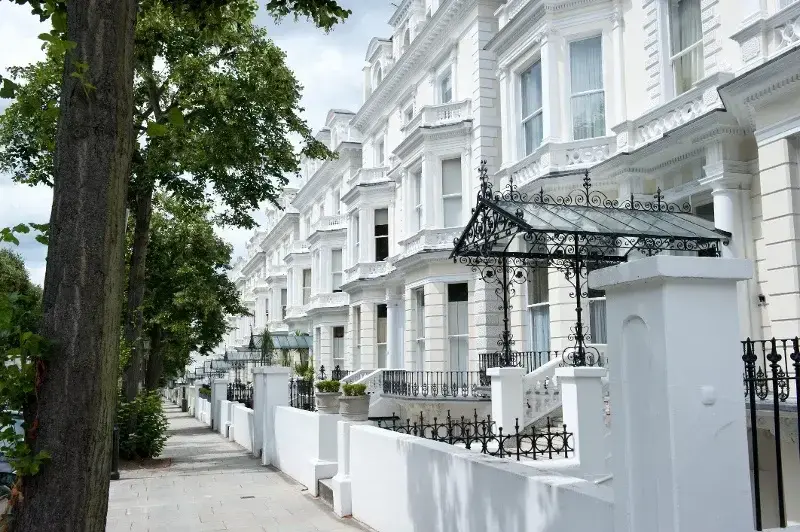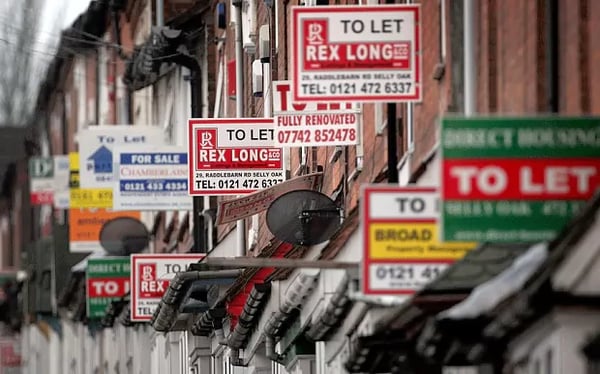

[Estimated time to read: 8 minutes]
![]()
Did you read the headlines in the British press boasting Bank of England economist Andy Haldane’s opinion that property is a better bet than a pension?
He upset Ros Altmann – the former Pensions Minister said Mr. Haldane’s comments were “divorced from reality” and “irresponsible”.
For Britons at home and abroad, however, nothing tempers our collective passion for property.
Not even a three-pronged tax attack on buy-to-let investors, or the financial and bureaucratic restrictions on expats owning British property.
But leading financial market commentators believe the UK investment property market is a toxic place to invest, so wherein lies the truth?
- If you’re a British expat would you be wise to hold investment property assets back home, if only to retain a foot on the property ladder?
- And if you’re an expat from elsewhere in the world, would it make sense to cash in on the UK’s seemingly unstoppable property price gains?
- Or should you dump any property you have, and invest everything in a pension for maximum tax benefit?
The fact is there are very valid arguments for and against owning investment property in Britain.
You need to know the risks, the taxing downsides and the restrictions before you consider the opportunity, only then can you make the right decision for yourself.
Finally, property is not an alternative to a pension, but it may be a good investment for your future.
Let’s break it down…
Essential tax facts
Three successive budgets have attacked the buy-to-let landlord.
- Summer 2015 Budget: there will be a gradual removal of the ability of small landlords to deduct the cost of mortgage interest from their income before calculating their tax liability.
- Autumn 2015 Statement: higher rates of stamp duty will apply to buy-to-let or second property purchases from 1 April 2016.
- March 2016: a higher rate of capital gains tax will apply to gains made on residential property from 6 April 2016.
Speaking about these tax attacks, David Cox, director of the Association of Residential Letting Agents, said:
“The sector has been punitively taxed, with stamp duty on buy-to-let properties, mortgage interest relief and now capital gains tax changes. It’s an outright assault on the sector.”
He’s right, but the situation can be even worse for non-resident, expat landlords because: -
- UK income tax is charged on income from rental property situated in the UK regardless of your residence status as a landlord. Your rental income may also be subject to tax in your home state/nation of tax residence, depending on any double taxation agreements
- The UK can charge non-residents Capital Gains Tax on the disposal of residential property
- Non-resident companies have potentially been liable to UK capital gains tax on the disposal of UK residential property since 1 April 2013 if the property was valued at more than £2 million. That threshold has now dropped to just £500,000
Important note: These tax rules all assume your investment in British property is an investment management strategy to generate rental income and with a view to long-term capital growth.
However, if you acquire property with the main aim of realising a gain on its disposal, with or without any development of or improvement to the property, gains made on disposal will normally be treated as income rather than as capital gains and taxed at a much higher rate.
And never forget the Inheritance Tax risk your estate can incur when you own British property, because from 6 April 2017 neither your country of domicile nor residence NOR the use of an offshore company to hold the property will necessarily protect you from IHT when it comes to UK property assets.
Net yield is the only thing that matters
For the first quarter of 2015 the average rental yield for a one-bed property across the UK was 5.9%, 5.3% for a two-bed, 4.7% for a three-bed and 4% cent for a four-bed.

The idea of getting upwards of a 6% annual yield on an appreciating and tangible asset is very appealing in these times of record low interest rates.
However, there can be a gulf between gross and net yields that makes the idea of investing in British property far less appealing when you crunch the numbers.
We have reproduced the following two tables from SensibleInvesting.tv because they illustrate clearly how the headline yield soon dwindles when you work it down to the net figure:
| Basic Assumptions | £ | % |
| Annual rent | 9,000 | |
| Gross rental yield | 5.3 | |
| Occupancy % | 95 | |
| Property value | 169,811 | |
| Investor's capital | 50,000 | |
| Interest only mortgage | 119,811 | |
| Mortgage interest rate | 3 |
| Monthly Budget | IN> | OUT |
| Monthly rent | £750 | |
| Vacant periods | £38 | |
| Monthly maintenance/ management | £250 | |
| Mortgage interest | £300 | |
| Net income | £163 | |
| Net rental yield before tax (on property value) |
1.2% | |
| Tax @ 40% | £65 | |
| Monthly income net of tax | £98 | |
| Net rental yield after tax (on property value) |
0.7% | |
| Yield on investor's capital (£50,000) after tax | 2.3% | |
| Annual income net of tax | £1,173 |
Editorin-Chief of MoneyWeek, Merryn Somerset Webb, wrote an article for The Spectator last year called Buy-to-let investing just became a very, very bad idea, and it shows how the latest tax attacks on the sector can turn a tidy profit into a loss: Sometimes it can help to get an expert opinion when considering an investment approach.
“A landlord paying tax at 40 per cent has an 80 per cent loan-to-value mortgage. He gets £10,000 in rent and pays £8,000 in interest. On his £2,000 profit he currently pays 40 per cent of £2,000 (£800) leaving him a net gain of £1,200. However, come 2020 his tax bill will be calculated on his turnover minus a 20 per cent tax credit. And 40 per cent of his £10,000 turnover is £4,000. The relief comes to 20 per cent of the interest (£8,000 × 20 per cent = £1,600). The result is a £2,400 tax bill. Add that to his mortgage interest and you will see that his annual profit of £1,200 has turned into an annual loss of £400. Nasty.”
The Money Editor of The Guardian Patrick Collinson summed up his feelings about the sector in the title of his most recent article on the matter Bye Bye buy to let…
However, Stuart Law, Chief Executive of Assetz and one of the most influential figures in property in the UK according to The Telegraph, advises that prospective landlords can still profit but should look North, where lower acquisition prices, better potential for capital growth and higher yields can all be found.
And Henry Pryor, a buying agent and a favoured property expert for the BBC, says:
“Talk of the demise of buy-to-let is greatly exaggerated.”
In other words, you will always be able to find an opinion to suit your argument, and in this case, it’s unhelpful.
The opportunity
HousePriceCrash.co.uk has a prediction on its front page from the National Housing Federation that claims property prices will increase by another 35% to 2020, suggesting that surely, if you buy the right property at the right price in the right location you won’t go wrong.
And many agree with Bank of England economist Andy Haldane’s opinion that:
“As long as we continue not to build anything like as many houses in this country as we need to ... we will see what we’ve had for the better part of a generation, which is house prices relentlessly heading north.”
What’s more, for any Briton living abroad who may one day want to return to the UK permanently, there’s a lot to be said for keeping a foot on a rung of the property ladder because the market does have a tendency to run away with itself.
Landlordzone.co.uk lists these five equally solid reasons for considering British property as an investment asset:
- The private rental sector is vital for UK housing…
- …and it’s growing in size as a result
- Current landlords are confident about their investments
- Property remains relatively safe compared to other investments
- The buy-to-let mortgage market is at its strongest
And there’s one other very timely consideration as well, namely:
Now’s a great time to borrow money
Just like savings rates, personal loan and mortgage rates have never been so low, which may make now a very sensible time to leverage, or gear up capital.

Taking an example from SensibleInvesting.tv again, here’s how borrowing money to invest in property can work in really basic terms:
Assuming most buy-to-let mortgages require a third of the value of the property be put down as a deposit – if you buy a £150,000 house you can put down just £50,000 and borrow £100,000.
This is gearing and the reward on your capital increases in line with the multiple of your capital that you borrow.
For example, if your property increases in price by 20% over a period of time, based on the above example you will make £30,000.
That is a 60% return on your capital invested.
However, never forget about the potential for a crash.
There have been two big falls since the mid-1980s, starting respectively in 1989 and 2007, and British property values fell by between 20% and 35%.
Going back to the above example, if the market declined by 20% you would lose £30,000 of your £50,000 capital invested – and a crash of 35% would all but wipe out the value of your equity capital.
Making the right decision
As always with financial decisions, the right decision can only be based on your personal circumstances.
There are options, alternatives, risks and benefits all associated with British property as an investment asset.
If you already hold assets, there may be more tax efficient ways to structure your holdings.
Structuring property purchasing and financing well is particularly critical for expats where the interplay of tax, lending, and legal structures have the potential to either maximise or minimise returns.
If you’d like a second opinion on your property portfolio, taking into consideration areas where you can save tax and perhaps structure more efficiently, (for example: lending in order to mitigate tax and enhance your return), I'd be pleased to offer that service. Contact me at your convenience and we can schedule a conversation.
Property + pension = ?
A final word, property and pensions are not mutually exclusive.
You don’t have to have one or the other; in fact, both sit so well together you can now hold some types of property assets within certain types of pensions.
What’s more, pensions can have very attractive tax breaks depending on your personal circumstances.
Ultimately, your long-term financial goals will only be met when you determine the right saving, investing and pension strategy and stick to it.
Which sounds simple because it is! We’ve written a guide to building a portfolio which you might find useful food for thought.
As always, please do get in touch if we can help you in any way.

